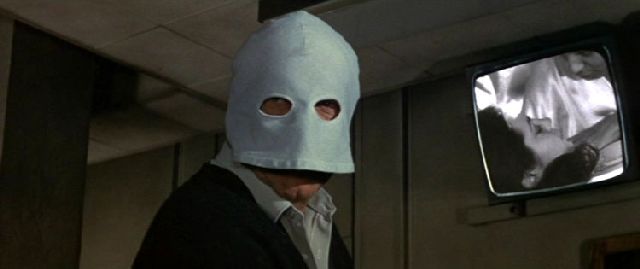The Kremlin Letter (1970) 
“World War III…in an envelope!”

Director: John Huston
Cast: Bibi Andersson, Richard Boone, Nigel Green
Synopsis: During the Cold War a Naval Intelligence officer endowed with a powerful photographic memory is transferred to the CIA to participate in a covert operation in Moscow.
Mention 1960s spy movies to most people and their thoughts will invariably turn to the films of James Bond (or the numerous spoof rip-offs like Flint and Matt Helm which sought to exploit his popularity), and by association a glamorous world of intrigue and adventure in which handsome men in tuxedos flirt with death and gorgeous women in approximately equal measure. They picture a jet-set lifestyle of shaken martinis, Caribbean casinos and Aston Martins. But there was a significant body of films from the 1960s that actively sought to distance themselves from these spurious fabrications by creating an altogether more mundane world in which grey men practiced their craft in dingy offices. Films like The Spy Who Came in From the Cold (1965), The Defector (1966), and The Deadly Affair (1966) painted a determinedly seedier picture of the spy game, one which was just as deadly but which bore no traces of glamour. John Huston’s spy thriller The Kremlin Letter, while not quite steeping itself in the depressing gloom of these films at least bore more resemblance to them than it did the gadget-filled world of James Bond.
Patrick O’Neal – a fortuitous substitute for an unavailable James Coburn – plays Charles Rone, a naval officer who suddenly finds himself thrown out of the service (by director John Huston in a cameo role). It seems that a covert intelligence agency has pulled rank on the navy because it wants to recruit their man for a mission. Rone meets with an agent called Sweet Alice (Michael MacLiammoir), whom we’ve already met in a pre-title sequence when he passed a cloakroom ticket to a suitcase containing $1 million to a man named Poliakoff who subsequently winds up dead in a prison cell visited by a Colonel Kosnov (Max von Sydow). The payment is Poliakoff’s fee for the task of obtaining the eponymous letter. Anyway, Sweet Alice vets Rone before handing him a suitcase which he’s to pass on to The Highwayman (Dean Jagger), a top level agent masquerading as a priest.
The Highwayman is conducting a funeral service when Rone arrives, and is accompanied by an amiable Southerner of hearty good cheer named Ward (Richard Boone). After a clumsy piece of exposition in which Ward gives Rone a potted history of his (Rone’s) own life, Ward informs Rone that a couple of the reasons he was selected was because he possesses a photographic memory and is fluent in eight languages, and then gives him the task of rounding up three retired agents and bringing them to New York. These men go under the code names of The Whore (Nigel Green), the Warlock (George Sanders, who’s a monstrous vision in drag when we first meet him) and Erector Set (Niall MacGinnis). Erector Set, a former safecracker has arthritis and therefore nominates his daughter, B. A. (Barbara Parkins), for the mission, whatever it might be.
Back in America, Ward informs Rone that some months earlier a US government official took it upon himself to write a letter promising that America would assist Russia in preventing China from amassing nuclear weapons if the need arose, a statement which he describes as tantamount to declaring war on China. It’s their mission to retrieve that letter from wherever it may now be and destroy it, which will require them all to go undercover in Russia.
The Kremlin Letter is one of those movies to which you have to pay very close attention from the very first scene if you don’t want to spend the rest of its running time wondering what the hell is going on. Given that this is a spy movie – a genre which is riddled with subterfuge and lies – it’s perhaps to be expected that the eponymous letter is actually a red herring, nothing more than a Macguffin which provides Huston and co-writer Gladys Hill with the means with which to devise a deviously complicated tale. The synopsis above describes only a fraction of the story, and omits a number of characters who are key to its telling. There’s Erika Kosnov (Bibi Andersson), who was once married to Poliakoff and is now the wife of the Colonel, with whom Rone embarks on a doomed affair; there’s Captain Potkin (Ronald Radd), whose wife and two daughters the US spies kidnap and threaten to kill simply because they wish to use his Moscow flat as a base, and his ruthless boss, Bresnavitch (Orson Welles), who’s embroiled in one of those political in-fights that prove ultimately more dangerous for innocent peripheral figures than it does for those in the thick of it.
It’s a first-rate cast, and its members dance around each other in a complex pattern, creating overlapping ripples that will confound the inattentive viewer. Patrick O’Neal in the lead role provides a level of sobriety which would have been beyond the more expansive Coburn, while Max von Sydow stands out amongst a stellar cast as the Russian colonel whose cool exterior conceals a nest of insecurities and self-loathing that slowly becomes more apparent as the story unfolds. Huston directs them with an assured hand, maintaining a suitably objective distance from the characters, and often framing them in a way that emphasises the traps within which they each operate.
My only criticism about the film itself is that, given its theme, it’s almost inevitable that we must encounter treachery somewhere along the way, and the source from which it arrives is perhaps a little too predictable for most viewers.
(Reviewed 2nd December 2013)
My thanks to Ann for providing me with a copy of this movie)
httpv://www.youtube.com/watch?v=bbTy_xzH5oA
